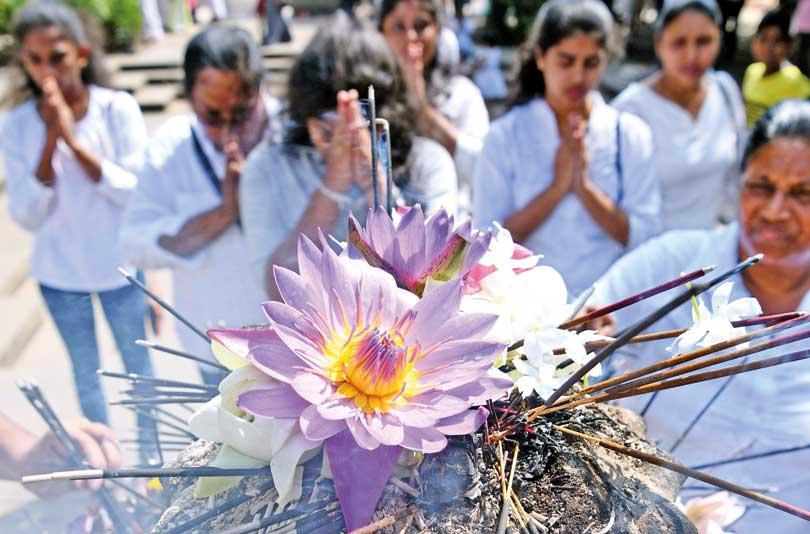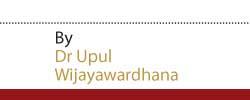Reply To:
Name - Reply Comment
Last Updated : 2024-04-19 00:03:00

 As an avowed admirer of the profoundness of the science and philosophy, Gautama Buddha gifted to mankind, I was overjoyed to read that Theravada Tripitaka was to be recognised as a World Heritage. But my elation was short-lived as I realised, contrary to misleading media reports, it is yet to happen. A ceremony is due to take place on March 23 at the Maha Maluwa of the Temple of the Sacred Tooth Relic, to make the announcement that Sri Lanka is making this request to UNESCO.
As an avowed admirer of the profoundness of the science and philosophy, Gautama Buddha gifted to mankind, I was overjoyed to read that Theravada Tripitaka was to be recognised as a World Heritage. But my elation was short-lived as I realised, contrary to misleading media reports, it is yet to happen. A ceremony is due to take place on March 23 at the Maha Maluwa of the Temple of the Sacred Tooth Relic, to make the announcement that Sri Lanka is making this request to UNESCO.
Tripitakabhivandana week commenced on March 16. Going through the details, the cynic in me, made me wonder whether it is the beginning of the re-election campaign of President Sirisena, in spite of his solemn undertaking to the contrary, in January 2015. According to scriptures, the Buddha, in His sojourn through samsara, is supposed to have committed nearly every sin, but one that he never committed, is to lie. May be His Excellency is unaware of this fact!
President Sirisena declared Theravada Tripitaka a National Heritage in January at Aluviharaya Temple in Matale, which is very fitting, as the transcription of Buddha’s teachings to the written word was completed at the Fourth Council of the Sangha, Dhamma Sangayana, held there in the first century BCE. Many were under the impression that Tripitaka was already a part of our National Heritage but, if it was not so, we should be thankful to the President for correcting this long-overdue anomaly.
I prefer introspection rather than accepting, blindly, that we are the guardians of ‘pure’ Buddhism. Though it is true that Theravada is the least adulterated of all the Schools of Buddhism, I maintain that we should reform, getting rid of defilements, later introduced.
Brahmins never ceased to act in their own interest. Having introduced subtle changes to the Vedas, transforming Hinduism to Brahminism, they appointed themselves as the ‘go-betweens’ and created a caste system which destroys the social fabric to this day. Buddha rebelled against this injustice and this rebellion had to be contained. Rather than making Him a martyr by rejection, they very cunningly included Him: by making Him the ninth avatar of Vishnu! Well, they did not stop at that and attempted, in my opinion successfully, to adulterate Buddha’s pristine teachings, then flourishing in Lanka.
President Sirisena declared Theravada Tripitaka as a National Heritage in January at Aluviharaya Temple in Matale, which is very fitting, as the transcription of Buddha’s teachings
Some consider Buddhaghoa, the 5th- century Indian Theravada Buddhist scholar, as the most important commentator of Theravada but many consider him an ‘agent’ of the Brahmins. Buddhaghosa is said to have been responsible for synthesising and translating a large number of commentaries written in Sinhala to the Pali Canon. These Sinhala commentaries were burnt after translation. There is belief that it was done by Buddhghosa himself, as acknowledged in the introduction to the English translation of Visuddhimagga, Buddhghosa’s best known work, by Venerable Nanamoli (who was born Osbert John Moore).
Interestingly, on completing the translations, Buddhaghosa returned to India, never to be heard of again; having successfully achieved his objective of adulterating Theravada.
Prof. M. M. J. Marasinghe, former Professor of Pali and Buddhist Studies in Kelaniya University, has written extensively about adulteration of Theravada Buddhism and in his article “The great betrayal of Theravada Buddhism?” (‘The Island’ 21 June 2014) highlights three main adulterations. Some key paragraphs from this article are as follows:
“Up to this point in Sri Lankan history, the Buddha to the Theravadins was a human being. He left the household life, early and attained Buddhahood after six long years of severe ascetic practices. He lived a simple life, walked bare-footed and followed the age-old ascetic practice of going round for his only meal of the day, if he did not have an invitation. He passed away at eighty years under a sála tree, lying on his folded upper robe. He was glorified by the later writers who had neither deep nor clear understanding of the great man or of the Dhamma he gave to the world.
This Theravada Buddha, still preserved in the Pali canonical texts, is vastly different from the glorified Buddhas of the Pali commentaries of Buddhaghosa. It was as the result of the fruition of his merit, accumulated through innumerable eons of life in sansára that the Buddha attained Enlightenment in this life. In spite of Buddhaghosa’s insistence on the indispensability of merit, the Buddha has never referred to, either accumulation of merit or past merit as a factor for Buddhahood or the attainment of nibbana. It must be noted here that the theory of accumulation of merit and the theory that merit can be donated to other parties are both alien to the Buddha’s teaching.”
The new ritual Buddhism which changed the Theravada Buddhism into a system of worship, offering and prayer, has been very carefully planned
In addition to quoting many other facts, Prof Marasinghe states:
“It is Buddhaghosa who claims in his commentary on the Ratana Sutta that it was first chanted by the Buddha to heal the city of Vesali of the devastating epidemic and affliction by non-humans. It must be noted here that Buddhaghosa’s claim of an epidemic is not supported by any other literary or historical source. ………. ”
“The most important of these changes are those effected in the concept of the gods. Instead of gods who are merely a class of worldly beings, in the new Buddhaghosa religion, they have many functions to perform.”
Prof. Marasinghe’s concluding paragraph aptly sums up the regressive metamorphosis of Theravada Buddhism in Sri Lanka:
“Thus, all aspects of the new ritual Buddhism which changed the Theravada Buddhism into a system of worship, offering and prayer, has been very carefully planned and smuggled into practice with several bonus packages for the operators. At the base of all rituals was the donation of merit to the gods with a request for their protection. It must be noted here that the gods whose protection was prayed for were not the gods like Sakka, but South Indian gods like Vishnu, Natha, Pattini, etc.”
One of the most despicable acts was the introduction of caste as a criterion for ordination, initially by Malwatta Chapter, diametrically opposite to the teachings of the Buddha; a victory of Brahminism over Buddhism.
Our Sangha, unashamedly, discouraged the re-establishment of Mehenini Sasna. They insult the Buddha by stating that even the Buddha was reluctant to ordain women. Can you believe Buddha’s fairness crossed cast-barriers, not gender!
Of late, a fashion has developed of self-declared enlightenment which I discussed in detail in my article “Epidemic of Enlightenment” (The Island, 1 January 2018). Some have started claiming that the Buddha was born in Sri Lanka while some others have started reinterpreting Buddhism from Maghada, stating that Pali distorted the teachings.
Thus, all aspects of the new ritual Buddhism has been very carefully planned and smuggled into practice with several bonus packages for the operators
From the time of the Parinibbana of the Buddha, the method used to ensure His teachings continue unadulterated, unaltered have been the Councils of the Sangha, Dhamma Sanghayana. In fact, it is this practice that led to the term Theravada and to the notion that Theravada is the ‘purest’ form of Buddhism.
Fourth Council was held in Aluviharaya in first century BCE, followed by the fifth in Madalay in 1871 and the last in Rangoon in 1954. It is high time Sri Lanka hosted the Seventh Council, but this should be different; perhaps, with a name change as it should include not only scholarly monks, but also lay experts as well, for a critical analysis, so that myths built around the great teachings can be discarded.
It is incumbent on us to ensure the true teachings of Gautama Buddha, the science and philosophy of Buddhism, be available for the entire humanity to benefit.
In my humble opinion, caste discrimination, antithesis to Buddha’s teachings, is the most urgent issue that needs addressing.
Ven. Walpola Rahula Thera, one of our most erudite scholars and the first Buddhist Monk to be made a Professor in a Western University, opined as follows:
“It is well known that caste divisions have no place in Buddhism and the Buddha did not care for the age-old tradition of caste even as much as dirt on his feet. All castes were represented in his following. The cornerstone of His ‘Sasana’ is equality. In this situation, it pains me immensely to state that Bhikkus in Sri Lanka uphold the caste system.”
“With great respect to you and with your permission, may I address the hierarchy of Siyam Nikaya about your attitudes to caste? How can it to be a religious tradition, granting ordination only to those belonging to Govigama caste, refusing ordination to others on the premise that their castes are inferior? Admittedly, we can never get rid of class and caste differences completely, but to enshrine caste as a religious tradition in Buddha Sasana is unimaginable and preposterous. This is a practice that insults the Buddha and turns the back on His teachings. Though you claim to be the protectors of Buddhism, let me very respectfully point out to you that, by your actions, you are undermining the very foundations of Buddhism. You are protecting your caste, not Buddhism. You are slowly destroying Buddhism.”
May I humbly request our Mahanayakas to heed this clarion call, made way back in 1934, as the first step towards making Theravada Tripitaka, a true World Heritage.

Add comment
Comments will be edited (grammar, spelling and slang) and authorized at the discretion of Daily Mirror online. The website also has the right not to publish selected comments.
Reply To:
Name - Reply Comment
On March 26, a couple arriving from Thailand was arrested with 88 live animal
According to villagers from Naula-Moragolla out of 105 families 80 can afford
Is the situation in Sri Lanka so grim that locals harbour hope that they coul
A recent post on social media revealed that three purple-faced langurs near t

10 Apr 2024
09 Apr 2024